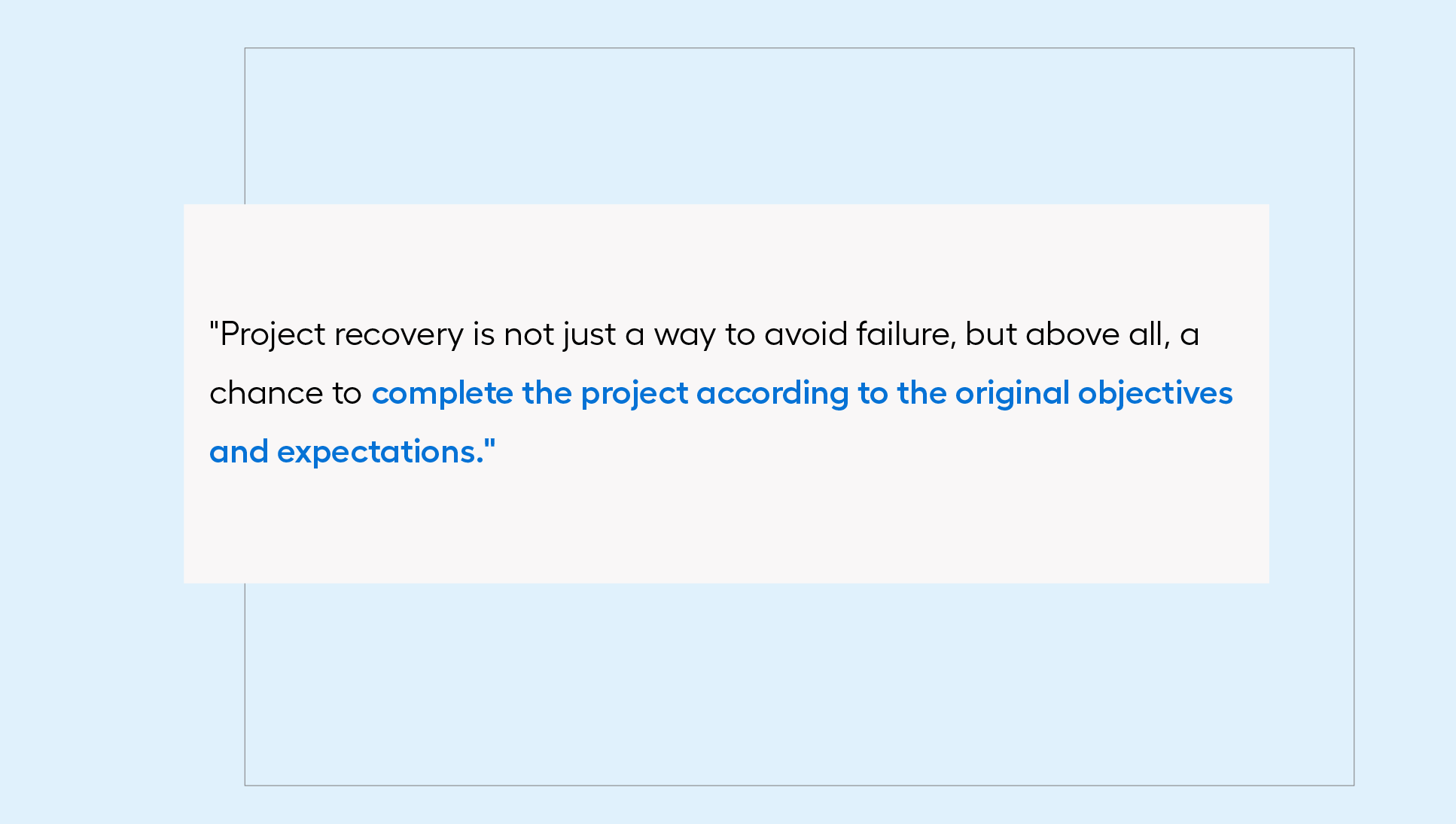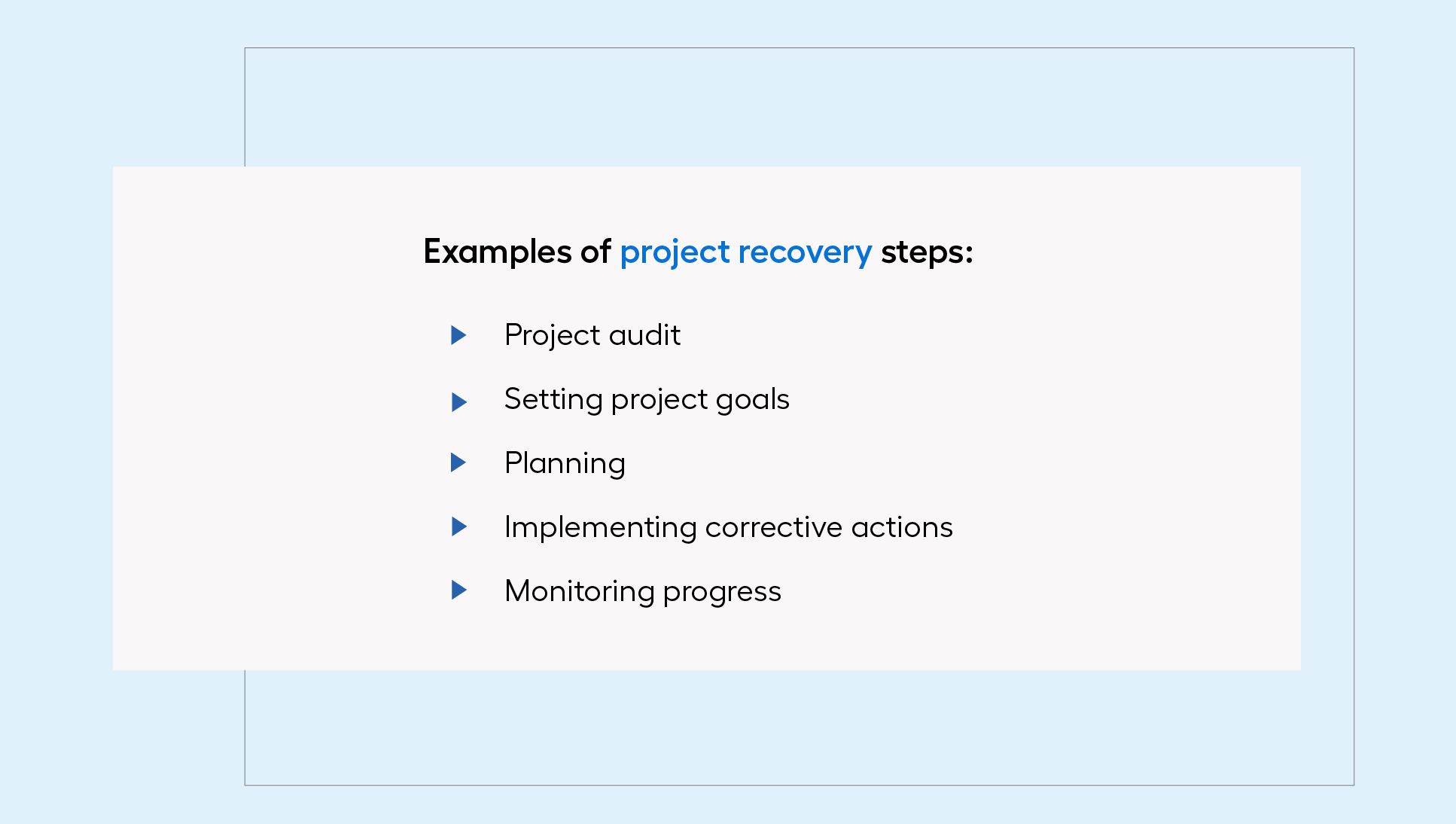Table of contents:
- What is project recovery?
- When should you consider project recovery?
- How should the project recovery process be conducted?
- What to pay attention to when choosing a Project Recovery service?
- When to opt for project recovery and when to start a new project?
- Project Recovery in IT - throwing a lifeline to your e-store
You're working on an eCommerce project, but things aren't going as planned? Project phases are delayed, errors are cropping up, and communication with the agency leaves much to be desired. What should you do?
Don't be quick to abandon the entire project. Instead of giving up, consider initiating a project recovery plan. With the right steps, depending on the specifics of the project, you can "rescue" key elements of the endeavour. This approach can help you save both time and budget, ensuring that the work already done doesn't go to waste.
In this article, you'll learn what this process entails in practice. You'll also discover what to look for when choosing a partner for this process and get practical tips. Ready to throw a lifeline to your project?
What is project recovery?
In the fast-paced world of eCommerce, where competition is fierce and customer expectations grow daily, even minor setbacks can lead to significant issues. Delays, budget underestimations, technical complications - these are just a few of the challenges that can cause a project to miss its goals, take on a different form than initially planned, or launch later than expected. However, none of these scenarios are without a solution. This is where project recovery comes into play. What does this mean in practice?
Project recovery is the process of salvaging a project that, for various reasons, is not progressing successfully. It involves both changes in project management and technical modifications aimed at getting the project back on track. Project recovery should not be seen merely as a way to avoid failure, but more importantly, as an opportunity to successfully complete the project according to the original objectives and expectations. By doing so, you can not only regain control over the project but also establish a solid foundation for its further development and strengthen your position in the market.

When should you consider project recovery?
Implementing eCommerce projects is often characterized by high dynamism, which frequently involves the need to make adjustments or adapt the project to new conditions. Minor delays or revisions are a natural part of the process and don't always necessitate intervention in the form of project recovery. However, it's important not to ignore warning signs, keeping in mind that the earlier a problem is detected, the easier and less time-consuming (and budget-consuming) it will be to save the project.
When should you consider project recovery?
- Significant project delays - prolonged missed deadlines can signal serious issues in management or execution that require immediate intervention.
- Poorly chosen production environment - an inappropriate choice of production environment or specific technologies can lead to performance, scalability, or security issues.
- Underestimated budget - if project costs are rapidly increasing and the original budget is insufficient, it may indicate financial planning errors or the emergence of unforeseen complications.
- Unsatisfactory communication with the agency - poor communication, lack of clarity about progress, or unresponsiveness to key questions are signs that chaos could be taking over the project, leading to inefficiency.
- Changing market conditions - sudden shifts in the business environment, such as the emergence of new competitors or changes in customer preferences, may require the project to be adjusted to current realities.
How should the project recovery process be conducted?
A successful project recovery process is difficult to fit into rigid frameworks because every project is unique and requires an individualised approach. However, there are certain steps that a software house should consider during the project recovery process.
First and foremost, it is essential to begin with a thorough analysis of the situation and an audit of the existing project. This will help identify the areas where the project needs improvement and determine which actions should be prioritised. Keep in mind that issues can arise from both technical problems (e.g., poorly chosen technology, inappropriate tools or modules, inefficient project environment) and management-related issues, such as budget underestimation or an improperly assembled project team.
Only after identifying areas for improvement and realistic (achievable in the current situation) goals can a detailed action plan be developed. This plan should take into account available resources, as well as time and budget constraints. Depending on the needs, the actions may include:
- system updates,
- data migration and organisation,
- refinement of individual modules and functionalities,
- changes in design and user experience,
- security improvements.
These are just examples of steps that can help regain control over the project and ensure its successful completion. Some projects may require a series of changes, while others might need fewer adjustments. The key is to maintain a flexible approach and tailor the plan to the current needs of the project. Continuous monitoring of progress is also crucial, as is the readiness to make further adjustments as needed.

What to pay attention to when choosing a Project Recovery service?
The decision to go with project recovery can be a crucial step in saving a project. However, before embarking on this process, it's important to carefully consider all aspects that may impact its success. To ensure that project recovery will be effective, pay attention to the following factors:
- Experience of the agency or software house - look into the agency's track record, particularly their experience in handling projects similar to yours.
- Project team - ensure that the team dedicated to your project has the necessary technical and managerial skills. It’s essential that the team includes diverse specialists (such as developers, testers, and project managers) who can identify problems and propose effective solutions.
- Communication methods - efficient and transparent communication is the foundation of successful project recovery. Make sure the agency uses clear and regular reporting methods, allowing you to monitor the recovery process in real-time and address any issues as they arise.
- Technologies used - inquire about the technologies being used and ensure they are well-suited to the specific needs of your eCommerce project.
When to opt for project recovery and when to start a new project?
Imagine a situation where repairing an old piece of electronic equipment turns out to be just as costly and time-consuming as buying a new one. While this is a simple example, it effectively illustrates the dilemma faced by eCommerce owners when a project fails to meet expectations. The question then arises: is it better to abandon the current project and start from scratch, or should you opt for project recovery?
Once again, the final decision depends on various factors. It’s advisable to consult with specialists who can help assess the actual state of the project. Two key aspects to consider are time already invested and the level of intervention needed to complete the project. For instance, if considerable time has already been spent on the project and it only requires minor adjustments, project recovery might be the ideal choice. However, if extensive changes are required, it might be more efficient to start a new project. Before making this decision, it's worth discussing with the software house whether what has been built so far can be salvaged. There may be a possibility of reusing some elements of the existing project in a new solution, which could save time and resources.
Project Recovery in IT - throwing a lifeline to your e-store
If you decide to undertake the process of saving a project, a thoughtful and strategic approach is crucial. Project recovery can be an effective tool to get a project back on track, but it requires commitment, proper planning, and the selection of the right solutions.
Remember, project recovery doesn’t have to be just a last resort. When used correctly, it can not only save the project but also improve its efficiency and long-term success. If you’re looking for support in optimising your project, feel free to contact us!
At Advox, we approach project recovery comprehensively, offering the support of an experienced team, transparent communication, and a broad technology stack. Our solutions are tailored to the specific need s of B2C and B2B projects, and with proven tools and a secure work environment, we ensure stability and effective project execution.







